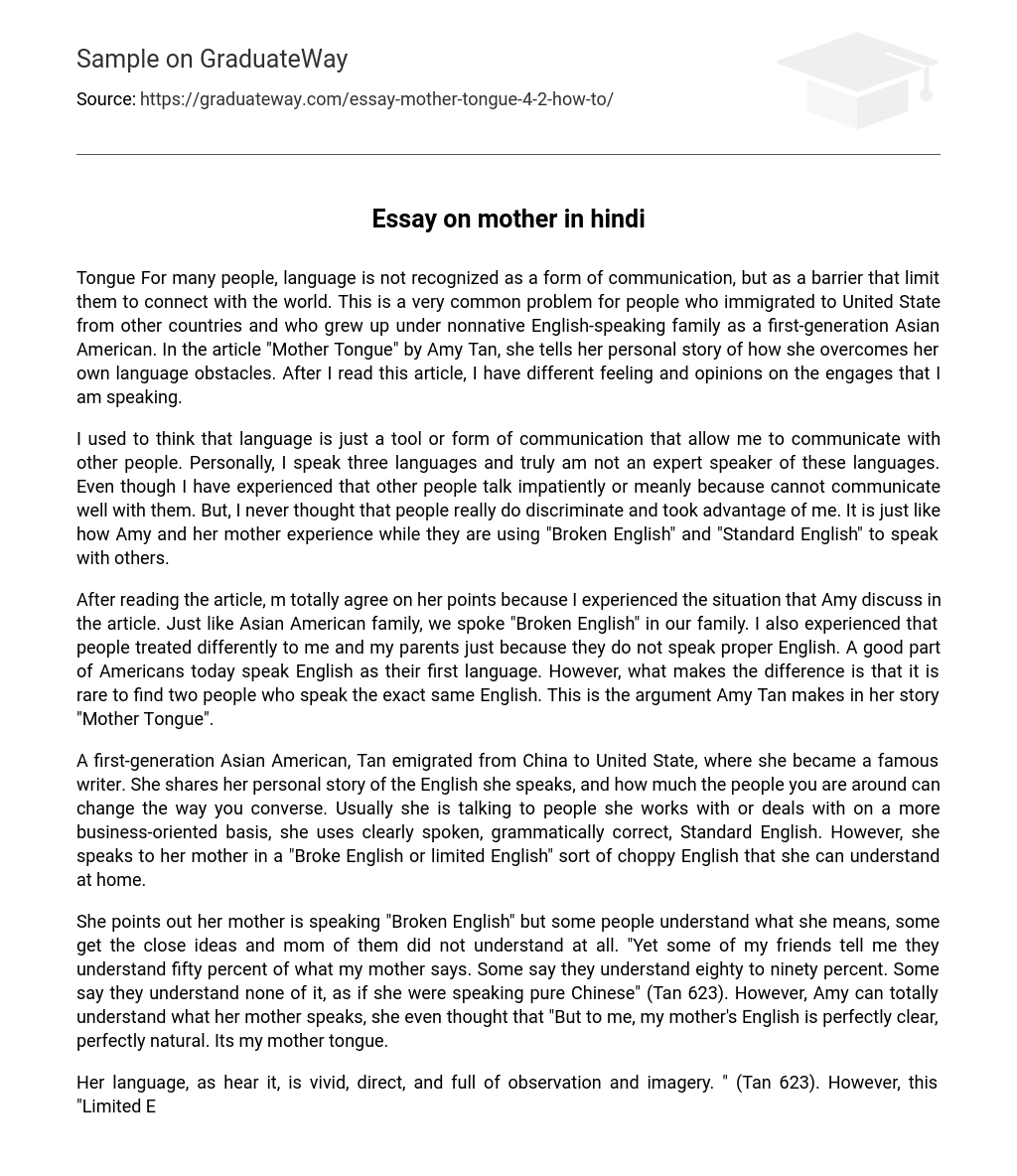The article “Mother Tongue” by Amy Tan explores the role of language in the lives of immigrants in the United States and first-generation Asian Americans raised in nonnative English-speaking households. It highlights their struggles with language barriers and showcases Tan’s personal journey to overcome them. This piece has significantly influenced my perception of the power inherent in communication.
In the past, I held the belief that language was only useful for communication and social interaction. Personally, I have a good command of three languages but do not consider myself highly proficient in any of them. Although I have encountered some individuals who are impatient or rude because of language differences, it never crossed my mind that people would discriminate against me or take advantage of my situation. Amy and her mother can relate to each other as they both face similar difficulties when communicating in both “Broken English” and “Standard English.”
Having read the article, I fully concur with Amy’s arguments as they resonate with my own personal experiences. Coming from an Asian American background, my family also communicated in what is commonly referred to as “Broken English” at home. I have firsthand witnessed the differential treatment that both myself and my parents receive due to our limited proficiency in English. Despite it being a widely spoken language in America, it is uncommon to encounter two individuals who speak it identically. In her narrative “Mother Tongue,” Amy Tan effectively underscores this point.
Tan, a first-generation Asian American, immigrated from China to the United States. She became renowned as a writer by sharing her encounters with the English language and emphasizing how social context influences communication style. In formal settings or when engaging with coworkers, Tan employs precise and grammatically accurate Standard English. Nevertheless, in her interactions with her mother at home, she utilizes a less formal and fragmented version of English called “Broke English” or limited English, which facilitates better mutual understanding.
Amy Tan discusses her mother’s use of “Broken English.” Some individuals can comprehend the intended meaning, while others only grasp the general idea or fail to understand it at all. Tan’s friends have different levels of understanding, ranging from 50% comprehension to 80-90%, with some unable to comprehend any of it, treating it as if it were pure Chinese. However, Tan herself fully understands her mother’s English and views it as clear and natural since it is her native language.
Her language, as I hear it, is vibrant, straightforward, and rich in observation and vivid imagery. ” (Tan 623). However, this “Limited English” that she learns with her mother has altered her perspective on language. While delivering a well-rehearsed speech, she realized that it sounded incorrect. The presence of her mother in the audience made her feel uncertain. “Recently, I became acutely aware of the different English that I use” (Tan 622). I have experienced a similar situation to Amy’s. Generally, we don’t concern ourselves with whether we are using proper English in my family.
Despite the grammar and word usage issues, we mostly focus on understanding each other and often directly translate Chinese to English. However, when I delivered a formal speech for my communication class about racing, my parents noticed that I was not delivering it correctly. Since “Limited English” is spoken in my family, we have developed our own language of intimacy that is a unique form of English understood only by my family.
When Amy discusses the cost of new and used furniture with her mother, she remarks, “Not waste money that way” (Tan 622). This implies that she advised her mom against spending unnecessarily on furniture. Such communication is common within families. As an illustration, my mother often expresses her discomfort in the air-conditioned room at home by saying, “Can u turn down the air condition? It is too cold in here.” Here, she means that the room is excessively cold and requests me to adjust the air conditioner’s temperature accordingly.
Being non-native English speakers, we use English only for communication within our family, and we communicate using “Broken English”. Nevertheless, after learning Standard English in college, I have come to realize that the English spoken at home is highly incorrect. I have noticed that some native English speakers judge individuals based on their proficiency in English. It can be quite embarrassing when my parents speak Broken English to others. Additionally, it infuriates me that people tend to dismiss my parents simply because they are unable to speak proper English.
My father had a distressing experience when he attempted to dispute charges on his stolen credit card. He contacted the bank to report the theft and to explain that most of the transactions from the past month were unauthorized. However, my father speaks with a strong Chinese accent. After speaking with the bank’s customer services for a short while, the representative abruptly interrupted my father and suggested that he visit a local bank where a Chinese bank teller could assist with translation because they were having trouble understanding him.
Amoy’s mother feels as though she has not been given proper attention at department stores, banks, and restaurants. According to her, she believed that the quality of what she had to say was reflected in her English. Imperfectly expressing herself made her thoughts appear imperfect. This belief was reinforced by the lack of seriousness, poor service, feigned misunderstanding, and even intentional ignorance she experienced in these establishments (Tan 623).
In summary, language facilitates communication, but it can also create obstacles for certain individuals. In her article “Mother Tongue,” Tan discusses her mother’s fluency in English and how it evolved over time. Tan recounts how she used to speak “Broken English” with her mother, but spoke “Standard English” in professional and business contexts. Despite the challenges posed by her mother’s limited English, Tan has navigated through various difficulties and assumed the role of communicating on her behalf.





